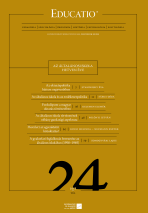A PISA-adatok használata és értelmezése - A módszertani kritikák tükrében
The Use and Interpretation of PISA Data in the Light of Methodological Criticism
Author(s): Judit LannertSubject(s): Education, Methodology and research technology, Evaluation research, ICT Information and Communications Technologies
Published by: Akadémiai Kiadó
Keywords: PISA; sampling; Rasch method; ranking; large-scale assessment;
Summary/Abstract: Since 2000, PISA (International Student Assessment), one of the most influential international programs of the OECD, has almost revolutionized our understanding of education. Th is program offers a unique way of carrying out comparative analyses of the world’s education systems. PISA has its admirers – as well as its opponents; it was already being criticized at its initial stages and is being criticized without break now. In my study I shall summarize the critiques of the PISA methodology, for example sampling, test item developing and the Rasch method. These critiques will help us get to understand what PISA is and is not good for. Although the league table of the world’s education systems seems to be the most popular product arising, PISA offers much more too, i.e. debunking educational myths and understanding what works in depth. Hungary’s longitudinal large-scale assessment system (NABC) provides more information for an understanding of the unsettling results offered by PISA to Hungary.
Journal: Educatio
- Issue Year: 24/2015
- Issue No: 2
- Page Range: 18-28
- Page Count: 11
- Language: Hungarian

